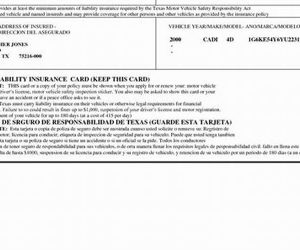Are you a business owner in Texas? If so, then you may need to purchase liability insurance to protect your company from potential damages and lawsuits. But what exactly is liability insurance, and what are the requirements for Texas businesses? In this article, we’ll walk you through everything you need to know about liability insurance Texas requirements so you can make an informed decision about protecting your company.
Liability Insurance Texas Requirements Explained
Liability insurance is a type of coverage that can protect your business in the event of lawsuits brought against your company due to accidents, injuries, or damages. This type of insurance can provide compensation for bodily injuries, property damage, legal fees, and more.
In Texas, liability insurance is typically required for businesses in certain industries or professions. For example, if you operate a transportation company, you’ll need to purchase liability insurance to cover your drivers in the event of accidents. Similarly, if you run a construction business, you’ll need to purchase liability insurance to cover your employees in case of injury or property damage on the worksite.
However, even if your business isn’t in one of these industries, it’s still a good idea to consider purchasing liability insurance. Accidents and unexpected events can happen to any business, and having liability insurance can give you peace of mind and protect your company’s finances.
Liability Insurance Texas Requirements: Who Needs It?
So, who exactly needs to purchase liability insurance in Texas? Here are some common industries and professions that require liability insurance:
| Industry/Profession | Liability Insurance Required? |
|---|---|
| Transportation | Yes |
| Construction | Yes |
| Healthcare | Yes |
| Legal services | Yes |
| Real estate | Yes |
| Manufacturing | Optional, but recommended |
| Retail | Optional, but recommended |
If you’re not sure whether your business needs liability insurance, it’s always best to consult with a licensed insurance professional who can help you evaluate your risks and determine the best coverage options for your company.
How Much Liability Insurance Do You Need in Texas?
The amount of liability insurance you need in Texas depends on a variety of factors, including the size of your business, the industry you’re in, and the specific risks you face. For example, a small retail business may only need a few hundred thousand dollars in liability coverage, while a large transportation company may need several million dollars in coverage for accidents involving multiple vehicles.
When purchasing liability insurance, it’s important to consider both the per-occurrence limit and the aggregate limit. The per-occurrence limit is the maximum amount of coverage available for any single claim or incident, while the aggregate limit is the maximum amount of coverage available for all claims during the policy period.
Some common liability insurance coverage limits include:
- $100,000 per-occurrence/$300,000 aggregate
- $500,000 per-occurrence/$1 million aggregate
- $1 million per-occurrence/$2 million aggregate
- $2 million per-occurrence/$4 million aggregate
The coverage limits you choose will depend on your business’s specific needs and risks. Again, it’s always a good idea to consult with an insurance professional who can help you evaluate your risks and determine the appropriate amount of coverage for your company.
What Does Liability Insurance Cover in Texas?
So, what exactly does liability insurance cover in Texas? Here are some common types of damages and expenses that liability insurance can help cover:
- Bodily injury: If someone is injured on your business’s property or as a result of your products or services, liability insurance can help cover the costs of medical bills, lost wages, and other damages.
- Property damage: If your business causes damage to someone else’s property, liability insurance can help cover the costs of repairs or replacement.
- Legal fees: If your business is sued, liability insurance can help cover the costs of legal fees and court costs.
- Punitive damages: In some cases, a court may award punitive damages to a plaintiff as a way of punishing the defendant for reckless or intentional behavior. Liability insurance can help cover these types of damages.
Keep in mind that liability insurance policies can vary widely depending on the provider and the specific coverage options you choose. Be sure to carefully review your policy to understand exactly what is and isn’t covered.
How Much Does Liability Insurance Cost in Texas?
Another important factor to consider when purchasing liability insurance is the cost. Unfortunately, there is no one-size-fits-all answer to this question, as the cost of liability insurance in Texas can vary widely depending on several factors.
Some of the factors that can affect the cost of liability insurance in Texas include:
- The size of your business
- The industry you’re in
- The amount of coverage you need
- Your company’s claims history
- Your company’s location
- The deductible you choose
When shopping for liability insurance, it’s important to get quotes from several different providers and compare the coverage and pricing options carefully. Be sure to read the fine print and ask questions if you’re not sure about any aspect of the policy.
What Happens If You Don’t Have Liability Insurance in Texas?
If your business is required to have liability insurance in Texas and you don’t have a policy in place, you could face serious legal and financial consequences. For example, if your business is sued and you don’t have liability insurance, you’ll be responsible for paying any damages and legal fees out of pocket. Depending on the severity of the claim, this could bankrupt your business.
Additionally, some industries may face fines or other penalties for operating without liability insurance. For example, if you operate a transportation company without liability insurance, the Texas Department of Transportation could suspend or revoke your operating authority.
FAQs About Liability Insurance Texas Requirements
1. What is the difference between general liability insurance and professional liability insurance?
General liability insurance covers your business for claims related to bodily injury, property damage, and advertising injury. Professional liability insurance (also known as errors and omissions insurance) covers your business for claims related to professional mistakes or negligence, such as a doctor being sued for medical malpractice.
2. Do I need liability insurance if I’m a sole proprietor?
It’s not legally required for sole proprietors in Texas to have liability insurance, but it’s still a good idea to consider purchasing coverage. Accidents and unexpected events can happen to any business, and liability insurance can help protect your personal assets if you’re sued.
3. What is the minimum amount of liability insurance required in Texas?
The minimum amount of liability insurance required in Texas varies depending on the industry and the specific risks involved in your business. It’s important to consult with an insurance professional to determine the appropriate amount of coverage for your company.
4. Can I purchase liability insurance online?
Yes, many insurance providers offer liability insurance policies that can be purchased online. However, it’s always a good idea to consult with an insurance professional to make sure you’re getting the appropriate coverage for your business.
5. Can I be sued personally if my business is sued?
As a general rule, your personal assets are separate from your business’s assets. However, if you’re found to have acted in a way that caused harm or damage to someone else, you could potentially be held personally liable. Liability insurance can help protect both your business and personal assets in these situations.
6. What is a deductible?
A deductible is the amount of money you agree to pay toward a claim before your insurance coverage kicks in. For example, if you have a $1,000 deductible and a claim is filed for $10,000, you’ll be responsible for paying $1,000 while your insurance provider will cover the remaining $9,000.
7. How can I find the right liability insurance policy for my business?
The best way to find the right liability insurance policy for your business is to consult with an insurance professional who specializes in commercial coverage. They can help evaluate your risks and recommend appropriate coverage options.
Conclusion
Liability insurance is an important consideration for any business owner in Texas. Whether you’re required to purchase coverage or simply want to protect your company from potential damages and lawsuits, it’s important to understand the requirements and options available to you.
By working with a licensed insurance professional, you can evaluate your risks and determine the appropriate amount of coverage for your business. With the right liability insurance policy, you can have peace of mind and protect your company’s financial future.
 Interogator Blog teknologi gadget canggih terbaru
Interogator Blog teknologi gadget canggih terbaru


